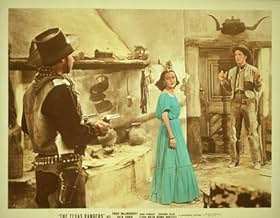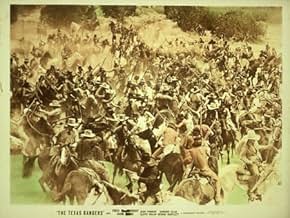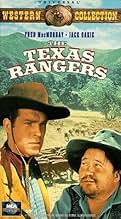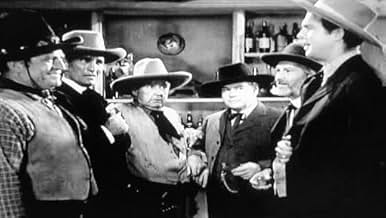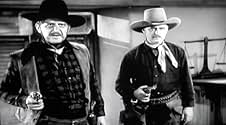AVALIAÇÃO DA IMDb
6,5/10
881
SUA AVALIAÇÃO
Adicionar um enredo no seu idiomaTwo down-on-their-luck former outlaws volunteer to be Texas Rangers and find themselves assigned to bring in an old friend, now a notorious outlaw.Two down-on-their-luck former outlaws volunteer to be Texas Rangers and find themselves assigned to bring in an old friend, now a notorious outlaw.Two down-on-their-luck former outlaws volunteer to be Texas Rangers and find themselves assigned to bring in an old friend, now a notorious outlaw.
- Direção
- Roteiristas
- Artistas
- Indicado a 1 Oscar
- 1 indicação no total
Benny Bartlett
- David
- (as Bennie Bartlett)
Fred Kohler
- Jess Higgins
- (as Fred Kohler Sr.)
George 'Gabby' Hayes
- Judge Snow
- (as George Hayes)
Stanley Andrews
- First Higgins Henchman
- (não creditado)
Irving Bacon
- David's Father
- (não creditado)
Kathryn Bates
- School Teacher
- (não creditado)
John Beck
- Stage Passenger
- (não creditado)
Hank Bell
- Hank Wallace, Texas Ranger
- (não creditado)
Virginia Brissac
- David's Mother
- (não creditado)
Avaliações em destaque
"The Texas Rangers" tells the story of three pals (Fred MacMurray, Jack Oakie, Lloyd Nolan) who are living the lives of outlaws until they become separated when cornered by a posse. MacMurray and Oakie wind up joining the Texas Rangers while Nolan becomes the notorious "Polka Dot Bandit". Eventually you know that the two sides will have the inevitable showdown. Great action scenes involving an Indian attack highlight the film.
A very young clean-shaven MacMurray is good in the lead and Jack Oakie is..well Jack Oakie as MacMurray's trusty sidekick. Nolan is fittingly evil as the grinning villain of the piece. Heroine Jean Parker plays MacMurray's love interest who convinces him of the error of his ways.
In the courtroom scene, watch for "B" western favorites George "Gabby" Hayes as a judge, Fred Kohlor as the town boss and Charles (Ming the Merciless) Middleton as his lawyer.
If the story seems familiar, it was remade as "The Streets of Laredo" in 1949 with William Holden, William Bendix and Macdonald Carey in the MacMurray, Oakie and Nolan roles respectively.
A very young clean-shaven MacMurray is good in the lead and Jack Oakie is..well Jack Oakie as MacMurray's trusty sidekick. Nolan is fittingly evil as the grinning villain of the piece. Heroine Jean Parker plays MacMurray's love interest who convinces him of the error of his ways.
In the courtroom scene, watch for "B" western favorites George "Gabby" Hayes as a judge, Fred Kohlor as the town boss and Charles (Ming the Merciless) Middleton as his lawyer.
If the story seems familiar, it was remade as "The Streets of Laredo" in 1949 with William Holden, William Bendix and Macdonald Carey in the MacMurray, Oakie and Nolan roles respectively.
This Western from back in 1936. It doesn't have the fancy special effects, nor color, nor big budget, etc. But it will stand up to just about any Western made today. In glorious black and white, it is one to see when you get the opportunity. Fred MacMurray is the star and does one of his best jobs of acting (seemed more relaxed), Jack Oakie (a great character actor with just the right touch of humor), Lloyd Nolan (who played the bad guy so well) and Jean Parker (the pretty girl who tames MacMurray). The story starts out with three friends who rob stage coaches until a posse catches up to them and they have to split up. MacMurray and Oakie become Texas Rangers with the idea of getting inside info for more hold ups. But experience with the Rangers and a smart girl turn the boys toward the side of the law. Problem is that LLoyd Nolan is still on the opposite side of the law and causing problems. Not to give anything away, but you can guess the ultimate showdown arrives. In between is plenty of action and exciting Indian attacks. Don't miss this one if you like Cowboys and Indians.
This Paramount studio effort stars Fred MacMurray, who many folks today only remember as the Dad in My Three Songs or the Flubber films. But MacMurry could do almost anything and do it well, from his cunning performance as the weak insurance foil in the classic noir Double Indemnity to his brilliant turn as the amoral business executive in The Apartment.
Here early MacMurray is pared with Jack Oakie, the latter an endearing studio performer who brings some genuine warmth and humor to what in many ways is a typical studio Western, but much richer than the usual B oaters churned out by Republic or Monogram; this is essentially a tale of cowboy reformation, as three thieving get separated by circumstance and two of them choose community and goodness, while one--the notorious polka dot bandit (!), played by Lloyd Nolan, stays outside the law. Nolan, who usually played good second leads or endearing detectives, effortlessly engages in a wee bit of method acting, convincing in his greasy charm, oozing villainy and malice.
While not a landmark film in any way, this is a casual, amiable entertainment, good for a lazy afternoon (coupled with a bowl of popcorn and perhaps a Charlie Chan mystery).
Here early MacMurray is pared with Jack Oakie, the latter an endearing studio performer who brings some genuine warmth and humor to what in many ways is a typical studio Western, but much richer than the usual B oaters churned out by Republic or Monogram; this is essentially a tale of cowboy reformation, as three thieving get separated by circumstance and two of them choose community and goodness, while one--the notorious polka dot bandit (!), played by Lloyd Nolan, stays outside the law. Nolan, who usually played good second leads or endearing detectives, effortlessly engages in a wee bit of method acting, convincing in his greasy charm, oozing villainy and malice.
While not a landmark film in any way, this is a casual, amiable entertainment, good for a lazy afternoon (coupled with a bowl of popcorn and perhaps a Charlie Chan mystery).
The Texas Rangers (1936)
Routine. There are elements here of Westerns earlier (there were hundreds of obscure ones) and Westerns later (including some well known ones), with stagecoach holdups and cowboy and Indian battles (the Indians lose again) and with pioneer justice. All of the above, plus a man reluctant to see the love of a lonely and lovely woman out on the edge of nowhere.
In a sense, it isn't worth watching if you have other Westerns up your sleeve. But--there has to be a but--the plot is interesting because it turns upside down more times than a tumbleweed, the filming (with Cronjager behind the camera) is straight up and strong, and we get an early look at unlikely Wild West hero, Fred MacMurray. For those who like Westerns, this is a decent mid-30s example, before the explosion of greater examples in 1939.
The title is exactly what the movie is about on the surface--the ragtag but well supported Texas lawmen known as the Texas Rangers (legendary enough to not only have a more recent widely panned movie about them made starring Ashton Kushner but also a Baseball Team). It almost is a promo piece for the group, with a voice-over in the beginning like those FBI films of the 1950s. MacMurray is actually a bandit, teamed up with a kind of goofy second lead, Jack Oakey. In fact, it seems like a comedy at first, and the lightweight air never quite lets up.
It does get more serious, though, not only about love (briefly) but about the honor and ability of the Rangers to fight not only Indians but outlaws. MacMurray gets in the middle of a major mess because he plays both sides of the game, as outlaw and newbie Texas Ranger. Lloyd Nolan enters the plot after awhile and is a great outlaw of his own. It's hard to take MacMurray seriously in this rough rough world, but the music pumps it up and the scenery is dramatic and he holds his own well enough for a middling movie.
And it's a bit long. Even if the plot seems to demand two hours with more and more twists, it loses something of velocity as it goes. King Vidor directed a number of notable silents in the 20s, and a few great 30s films (including the black and white parts of the Wizard of Oz). This one shows the solidity of a great director, and the wobbly backbone of a so-so script.
Routine. There are elements here of Westerns earlier (there were hundreds of obscure ones) and Westerns later (including some well known ones), with stagecoach holdups and cowboy and Indian battles (the Indians lose again) and with pioneer justice. All of the above, plus a man reluctant to see the love of a lonely and lovely woman out on the edge of nowhere.
In a sense, it isn't worth watching if you have other Westerns up your sleeve. But--there has to be a but--the plot is interesting because it turns upside down more times than a tumbleweed, the filming (with Cronjager behind the camera) is straight up and strong, and we get an early look at unlikely Wild West hero, Fred MacMurray. For those who like Westerns, this is a decent mid-30s example, before the explosion of greater examples in 1939.
The title is exactly what the movie is about on the surface--the ragtag but well supported Texas lawmen known as the Texas Rangers (legendary enough to not only have a more recent widely panned movie about them made starring Ashton Kushner but also a Baseball Team). It almost is a promo piece for the group, with a voice-over in the beginning like those FBI films of the 1950s. MacMurray is actually a bandit, teamed up with a kind of goofy second lead, Jack Oakey. In fact, it seems like a comedy at first, and the lightweight air never quite lets up.
It does get more serious, though, not only about love (briefly) but about the honor and ability of the Rangers to fight not only Indians but outlaws. MacMurray gets in the middle of a major mess because he plays both sides of the game, as outlaw and newbie Texas Ranger. Lloyd Nolan enters the plot after awhile and is a great outlaw of his own. It's hard to take MacMurray seriously in this rough rough world, but the music pumps it up and the scenery is dramatic and he holds his own well enough for a middling movie.
And it's a bit long. Even if the plot seems to demand two hours with more and more twists, it loses something of velocity as it goes. King Vidor directed a number of notable silents in the 20s, and a few great 30s films (including the black and white parts of the Wizard of Oz). This one shows the solidity of a great director, and the wobbly backbone of a so-so script.
On a whim, bandits Fred MacMurray and Jack Oakie enlist in the Texas Rangers. The two partner up with old pal Lloyd Nolan for some crooked schemes, but soon hear the call of duty, putting them at odds with their criminal lifestyle.
Like his most famous film, The Champ, director King Vidor imbues this with depression-era sensibilities and sentimentality, having lovable bums MacMurray and Oakie find self-respect, romance, and a sense of selflessness, all with a young orphan in tow.
Photography, direction, and action sequences are all first rate. The performances were a little dated, but adequate. Unlike others, I didn't find Oakie's good-old-boy character annoying or unrealistic.
Cameo appearances by George "Gabby" Hayes and Charles Middleton (Ming the Merciless) were a lot of fun too.
Like his most famous film, The Champ, director King Vidor imbues this with depression-era sensibilities and sentimentality, having lovable bums MacMurray and Oakie find self-respect, romance, and a sense of selflessness, all with a young orphan in tow.
Photography, direction, and action sequences are all first rate. The performances were a little dated, but adequate. Unlike others, I didn't find Oakie's good-old-boy character annoying or unrealistic.
Cameo appearances by George "Gabby" Hayes and Charles Middleton (Ming the Merciless) were a lot of fun too.
Você sabia?
- CuriosidadesKing Vidor made this movie to honor the celebrations of the centennial of the state of Texas.
- Erros de gravaçãoHawkins and the other Rangers are surrounded by Indians. He kills the 2 Indians rolling rocks, throwing his empty pistol at one. As he descends the other side, he mounts a bareback horse, riding off shooting a pistol that shouldn't be there as he rides away.
- Citações
Wahoo Jones: How do you expect to find Sam down in this country? Texas! Phooey! No towns, no ranch houses, no gals, no nuthin'. Hah! We can't see a jack rabbit in two days. Boy, you can't tell me we're still in the United States!
- ConexõesEdited into A Volta dos Mosqueteiros (1940)
Principais escolhas
Faça login para avaliar e ver a lista de recomendações personalizadas
Detalhes
- Tempo de duração1 hora 38 minutos
- Cor
- Proporção
- 1.37 : 1
Contribua para esta página
Sugerir uma alteração ou adicionar conteúdo ausente

Principal brecha
By what name was Atiradores do Texas (1936) officially released in India in English?
Responda
